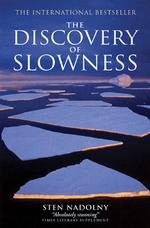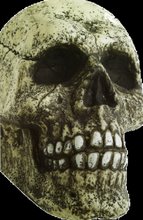BOOK REVIEW # 1
By Sten Nadolny 1983/ Canongate Books Ltd/ Paperback 320 pages (October 14, 2004)
ISBN: 1841954942
I have always been of the opinion events in history are best served when the static skeleton of reported facts, is adorned with flesh and given motion through the singular power of fiction. In the case of The Discovery of Slowness by Sten Nadolny my conviction is emphatically reinforced.
Based upon the life of famous 19th century explorer John Franklin, Nadolny portrays over fifty years of history. Credited with finding the Northwest Passage Franklin’s remarkable determination for discovery encompasses naval battles, shipwrecks and starvation in the Arctic.
Opening in the village of Spilsby, Lincolnshire, Nadolny introduces the early years of John Franklin’s life. A painstakingly slow and rather awkward boy, he is given more to a mental reflection of the world rather than an active participant within it. As John enters his youth the slowness that sets him apart from his peers is ever present. Bullied at school and born into an affectionless family typical of the time, John feels an overwhelming affinity with the motionless sea.
With each progressive chapter Nadolny tells of John’s first sea voyage and his subsequent experiences in the battles of Copenhagen and Trafalgar. However, crucially Nadolny recognises the material’s potential for being more than just an account of a man’s ascent to the greatness he is destined. Moreover, The Discovery of Slowness is far more a universal experience of an innocent trying to find meaning in a world during one of its most traumatic periods. Soon John meticulous slowness is proved to be a valuable asset in navigation and exploration. Now matured into a man he embarks on the path destined to be his making and demise, his quest for the North Pole.
Nadolny’s ability as a writer is evident in his masterful use of succinct, welcoming prose to focus reader attention upon John Franklin the man as much as the myth. This raises the book from simple genre classification within the confines of historical novel or fictional biography. Instead it is a story rich in its contemplation of childhood, communication, religion, science and human survival. After two failed but celebrated attempts to conquer the Arctic, John is officially made a captain and given an opportunity to govern Van Diemen’s Land. Later to be renamed Tasmania by Franklin himself; Nadolny uses this episode of his life to highlight the explorer’s lesser-known humanitarian aspirations. Removed from office and entering the twilight of his life John Franklin once more sets out for the Arctic.
Nadolny chronicles the final episodes in this great man’s life with a satisfying artistic flourish. One feels the man so often out of rhythm with the rest of the world does in the end discover the place where time ceases to exist.
Although perhaps not my usual choice of novel, I became engrossed in this book immediately and at its end I felt genuinely affected. It could be said Nadolny’s characterisation of John Franklin is not without its faults. For one he offers very little to the action in terms of direct dialogue, making him seem a little less convincing as a real person. Equally, the arduous lengths taken by the author to establish his main character as a man able to succeed in view of his extraordinary slowness mean in John’s moments of triumph he is in danger of appearing superhuman.
However, the heart of the novel is about the interior of John’s mind. Here Nadolny etches a detailed contemplation of the merits of a slower, more methodical outlook in regard to leadership, understanding and ultimately the human condition. The Discovery of Slowness was originally published in Nadolny’s native Germany in 1983 and has never been out of print. With this new English translation I urge you to ensure similar prosperity is enjoyed over here.
Rating: 7/10
ISBN: 1841954942
I have always been of the opinion events in history are best served when the static skeleton of reported facts, is adorned with flesh and given motion through the singular power of fiction. In the case of The Discovery of Slowness by Sten Nadolny my conviction is emphatically reinforced.
Based upon the life of famous 19th century explorer John Franklin, Nadolny portrays over fifty years of history. Credited with finding the Northwest Passage Franklin’s remarkable determination for discovery encompasses naval battles, shipwrecks and starvation in the Arctic.
Opening in the village of Spilsby, Lincolnshire, Nadolny introduces the early years of John Franklin’s life. A painstakingly slow and rather awkward boy, he is given more to a mental reflection of the world rather than an active participant within it. As John enters his youth the slowness that sets him apart from his peers is ever present. Bullied at school and born into an affectionless family typical of the time, John feels an overwhelming affinity with the motionless sea.
With each progressive chapter Nadolny tells of John’s first sea voyage and his subsequent experiences in the battles of Copenhagen and Trafalgar. However, crucially Nadolny recognises the material’s potential for being more than just an account of a man’s ascent to the greatness he is destined. Moreover, The Discovery of Slowness is far more a universal experience of an innocent trying to find meaning in a world during one of its most traumatic periods. Soon John meticulous slowness is proved to be a valuable asset in navigation and exploration. Now matured into a man he embarks on the path destined to be his making and demise, his quest for the North Pole.
Nadolny’s ability as a writer is evident in his masterful use of succinct, welcoming prose to focus reader attention upon John Franklin the man as much as the myth. This raises the book from simple genre classification within the confines of historical novel or fictional biography. Instead it is a story rich in its contemplation of childhood, communication, religion, science and human survival. After two failed but celebrated attempts to conquer the Arctic, John is officially made a captain and given an opportunity to govern Van Diemen’s Land. Later to be renamed Tasmania by Franklin himself; Nadolny uses this episode of his life to highlight the explorer’s lesser-known humanitarian aspirations. Removed from office and entering the twilight of his life John Franklin once more sets out for the Arctic.
Nadolny chronicles the final episodes in this great man’s life with a satisfying artistic flourish. One feels the man so often out of rhythm with the rest of the world does in the end discover the place where time ceases to exist.
Although perhaps not my usual choice of novel, I became engrossed in this book immediately and at its end I felt genuinely affected. It could be said Nadolny’s characterisation of John Franklin is not without its faults. For one he offers very little to the action in terms of direct dialogue, making him seem a little less convincing as a real person. Equally, the arduous lengths taken by the author to establish his main character as a man able to succeed in view of his extraordinary slowness mean in John’s moments of triumph he is in danger of appearing superhuman.
However, the heart of the novel is about the interior of John’s mind. Here Nadolny etches a detailed contemplation of the merits of a slower, more methodical outlook in regard to leadership, understanding and ultimately the human condition. The Discovery of Slowness was originally published in Nadolny’s native Germany in 1983 and has never been out of print. With this new English translation I urge you to ensure similar prosperity is enjoyed over here.
Rating: 7/10
If any of you have also read this book why not leave your comments and share your opinions?
Cheers
The Count



No comments:
Post a Comment